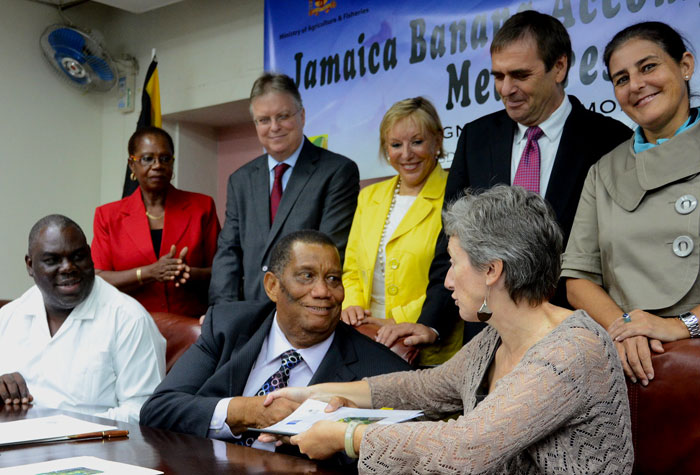Banana and Plantain Farmers to Benefit from EU Assistance
By: , November 12, 2013The Key Point:
The Facts
- The programme forms part of the Government’s poverty eradication strategy.
- They will be provided with assistance to enhance crop production and productivity.
The Full Story
Over 1,400 banana and plantain farmers, and other sector interests, will benefit from a $660 million (€4.73 million) European Union (EU)-funded Banana Accompanying Measures (BAM) special assistance programme, over the next four years.
The programme, which forms part of the Government’s poverty eradication strategy, targets small farmers and other beneficiaries totaling approximately 3,000, in the banana growing parishes of St. Thomas, St. Catherine, Clarendon, St. James, Portland, and St. Mary, whose crops and, by extension, livelihoods have been affected by factors such as severe weather.
They will be provided with assistance to enhance crop production and productivity.
An initial sum of nearly $400 million (€3.6 million) is being provided in two tranches for inputs and interventions accruing to the beneficiaries. The remainder of the funds is slated to come on stream later in the programme’s implementation.
Contracts for the provision were signed by Agriculture and Fisheries Minister, Hon. Roger Clarke, and Head of the EU Delegation in Jamaica, Ambassador Paola Amadei, among other stakeholders, during a brief ceremony at the Ministry’s offices at Hope Gardens, St. Andrew, on November 12.
One of the contracts, valued approximately $200 million (€1.171 million), which was signed by the EU and the implementing agency, Rural Agricultural Development Authority (RADA), covers actual implementation of the BAM, and makes provisions for the 1,400 beneficiary banana and plantain farmers, who are members of the All Island Banana Growers Association (AIGBA).
The allocation will be used mainly to provide capacity building and technical assistance to the AIGBA; support the establishment of a commercial entity for the association; provide infrastructural improvement for AIBGA stores and facilities; and strengthen district branches into production clusters.
The second contract for approximately $230 million (€1.9 million), signed by the EU and the Banana Board, earmarks grant allocations to provide technical services.
This undertaking will entail: updating and transferring production, diagnostic and technology protocol; updating and delivering an extension methodology package; implementing a public awareness campaign; preparing an institutional and financial framework for future delivery of extension services; preparing a financial framework for the delivery of applied research and technology transfer services; developing and expanding nursery operations for the production of new and conventional banana varieties; and reinforcing the system for distributing the plant seedlings.
The remaining $200 million (just over €1 million) will be allocated to the AIBGA in the form of a grant contract during the second year of implementation.
Speaking at the ceremony, Mr. Clarke described the provision as a “major investment.”
He said the Government facilitates these interventions in the sector, “because we believe, soundly, in the future of the banana industry”, which he contended is the “mainstay of the socio-economic activities of thousands of Jamaican farmers and their families.”
Mr. Clarke noted that the Ministry recently concluded implementation of the EU Banana Support Programme, which benefitted over 30,000 banana and plantain farmers and interests, in traditional banana dependent communities.
Activities under that programme, he outlined, included: construction of roads, bridges, weather stations, and banana databases. Additionally, he said the programme provided institutional support to the AIBGA as well as new technologies and extension services through the Banana Board and RADA.
The Minister pointed out that Jamaica’s food and nutrition security is continually threatened annually by hurricanes, drought, and floods, and the “spectre’ of climate change, with the banana industry among the sectors susceptible to these threats.
“Projects funded by the European Union continue to assist us, not only to recover production in the affected areas in the wake of a storm, but also to strengthen the resilience of farmers against future shocks and provide them with the livelihood-coping strategies and more sustainable production methods ,” he said.
Mr. Clarke expressed optimism that with the latest provision of resources, and the enhancement of the infrastructure, extension services, and management structure that they facilitate, there will be increased production for both local consumption and for export.
“We hold fast to our commitment to move production levels to 100,000 tonnes over the next couple of years,” the Minister added.
In her remarks, Ambassador Amadei said the BAM programme is designed to help Jamaica’s banana sector “adjust” to a changing global market.
“Bananas and plantains remain important for Jamaica. It is essential for food safety and production as well as for income and livelihood. The EU’s involvement in the sector shows that we have been present during these changing times and have been able to respond to the specificities of the Jamaican banana industry,” she noted.
Ambassador Amadei urged all stakeholders to take the necessary steps to ensure the banana industry’s long-term sustainability.
Meanwhile, AIBGA Chairperson, Grethel Sessing, in expressing gratitude for the EU’s intervention, said the association is “fired up and ready to go.”
“I offer my commitment to make the funds received via the BAM, work for the good of the industry and Jamaica, in general. Thank you EU…for the faith you have in the farmers of Jamaica and, moreso, the banana farmers. Thank you for your coverage, bold vision, insight, understanding, and for the power and reach of our actions,” Mrs. Sessing said.




